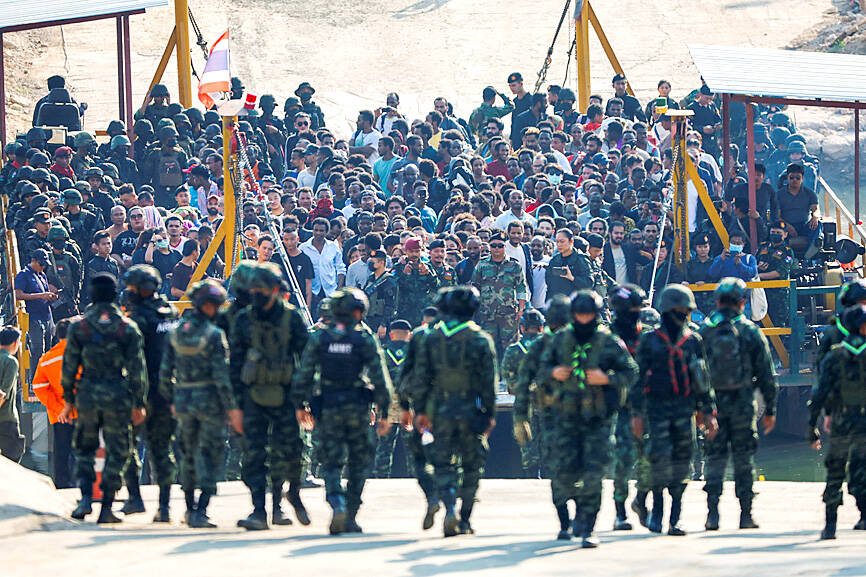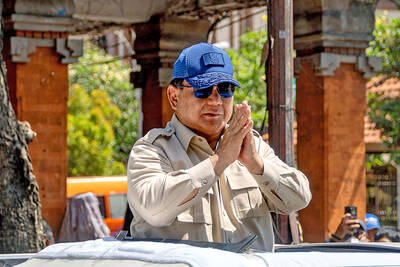Asian crime syndicates behind the multibillion-dollar cyberscam industry are expanding globally, including to South America and Africa, as raids in Southeast Asia fail to contain their activities, the UN said in a report yesterday.
Criminal networks that emerged in Southeast Asia in the past few years, opening sprawling compounds housing tens of thousands of workers, many trafficked and forced to scam victims around the world, have evolved into a sophisticated global industry, the UN Office on Drugs and Crime (UNODC) said.
Even as Southeast Asian governments have intensified a crackdown, syndicates have moved within and beyond the region, the agency said, adding that a “potentially irreversible spillover has taken place ... leaving criminal groups free to pick, choose, and move ... as needed.”

Photo: Reuters
“It spreads like a cancer,” said John Wojcik, a regional analyst for UNODC. “Authorities treat it in one area, but the roots never disappear; they simply migrate.”
Conservative estimates indicate there are hundreds of large-scale scam farms around the world generating tens of billions of dollars in annual profits, the UNODC said, calling on countries to work together and intensify efforts to disrupt the gangs’ financing.
“The regional cyberfraud industry ... has outpaced other transnational crimes, given that it is easily scalable and able to reach millions of potential victims online, with no need to move or traffic illicit goods across borders,” Wojcik said.
The US alone reported more than US$5.6 billion in losses to cryptocurrency scams in 2023 — including more than US$4 million in so-called pig-butchering scams or romance scams designed to extort money from often elderly and vulnerable people.
In recent months, authorities from China, where many of the gangs originate, Thailand and Myanmar have led a crackdown on scam operations in lawless areas of the Thai-Myanmar border, with Thailand cutting power, fuel and Internet supply to areas housing scam compounds.
However, syndicates have adapted, shifting operations between “the most remote, vulnerable and underprepared parts of Southeast Asia,” especially in Laos, Myanmar and Cambodia, and beyond, exploiting jurisdictions with weak governance and high rates of corruption, the agency said.
Raids in parts of Cambodia where the industry is most visible “led to significant expansion in more remote locations,” including the country’s western Koh Kong Province, as well as areas bordering Thailand and Vietnam, the agency said.
New sites also continue to be developed in Myanmar, it added, a country in the throes of an expanding conflict since the military seized power four years ago.
Spokespeople for the Cambodian government and Myanmar junta did not immediately respond to requests for comment.
Syndicates have expanded into South America, the agency said, seeking to enhance money laundering and underground banking partnerships with South American drug cartels.
They are increasingly establishing operations in Africa, including in Zambia, Angola and Namibia, and in eastern Europe, including Georgia, the agency said.
Gangs have also rapidly diversified their workforce, recruiting people from dozens of nationalities, it said, reflecting how the industry scams targets across the globe and has sought to evade anti-trafficking efforts.
Citizens of more than 50 countries — from Brazil to Nigeria, Sri Lanka and Uzbekistan — were rescued during recent crackdowns on the Thai-Myanmar border.
The international community is at a “critical inflection point,” the UNODC said, adding that failure to address the problem would have “unprecedented consequences for Southeast Asia that reverberate globally.”

DEADLOCK: Putin has vowed to continue fighting unless Ukraine cedes more land, while talks have been paused with no immediate results expected, the Kremlin said Russia on Friday said that peace talks with Kyiv were on “pause” as Ukrainian President Volodymyr Zelenskiy warned that Russian President Vladimir Putin still wanted to capture the whole of Ukraine. Meanwhile, US President Donald Trump said that he was running out of patience with Putin, and the NATO alliance said it would bolster its eastern front after Russian drones were shot down in Polish airspace this week. The latest blow to faltering diplomacy came as Russia’s army staged major military drills with its key ally Belarus. Despite Trump forcing the warring sides to hold direct talks and hosting Putin in Alaska, there

North Korea has executed people for watching or distributing foreign television shows, including popular South Korean dramas, as part of an intensifying crackdown on personal freedoms, a UN human rights report said on Friday. Surveillance has grown more pervasive since 2014 with the help of new technologies, while punishments have become harsher — including the introduction of the death penalty for offences such as sharing foreign TV dramas, the report said. The curbs make North Korea the most restrictive country in the world, said the 14-page UN report, which was based on interviews with more than 300 witnesses and victims who had

COMFORT WOMEN CLASH: Japan has strongly rejected South Korean court rulings ordering the government to provide reparations to Korean victims of sexual slavery The Japanese government yesterday defended its stance on wartime sexual slavery and described South Korean court rulings ordering Japanese compensation as violations of international law, after UN investigators criticized Tokyo for failing to ensure truth-finding and reparations for the victims. In its own response to UN human rights rapporteurs, South Korea called on Japan to “squarely face up to our painful history” and cited how Tokyo’s refusal to comply with court orders have denied the victims payment. The statements underscored how the two Asian US allies still hold key differences on the issue, even as they pause their on-and-off disputes over historical

CONSOLIDATION: The Indonesian president has used the moment to replace figures from former president Jokowi’s tenure with loyal allies In removing Indonesia’s finance minister and U-turning on protester demands, the leader of Southeast Asia’s biggest economy is scrambling to restore public trust while seizing a chance to install loyalists after deadly riots last month, experts say. Demonstrations that were sparked by low wages, unemployment and anger over lawmakers’ lavish perks grew after footage spread of a paramilitary police vehicle running over a delivery motorcycle driver. The ensuing riots, which rights groups say left at least 10 dead and hundreds detained, were the biggest of Indonesian President Prabowo Subianto’s term, and the ex-general is now calling on the public to restore their